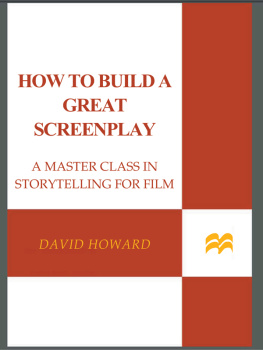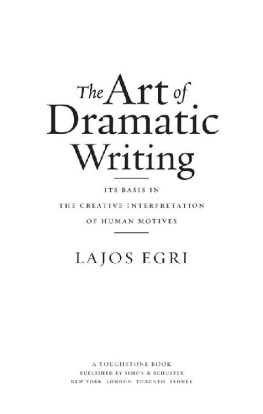1. The Map of Desire
) the actress Joanna Lumley escorted Will.i.am, co-founder of super-group The Black-Eyed Peas, around his home territory in south Los Angeles. She witnessed his good works: he had started a company that developed fabric out of recycled plastic bottles; funded educational initiatives for underprivileged youths; designed a building devoted to the art of music.
Will.i.am appeared to be a man at peace, content, and, for someone who exhibited such drive, such purpose, and who offered so many different accomplishments, he was relaxed in his demeanour.
Towards the end of the programme Lumley asked him what single quality was it, did he think, that was responsible for his success? He replied, Will. Joanna Lumley was initially confused, but then he added, Will I am. Will. Joanna Lumley understood and the logic behind the chopping of his name, William, into three different sections, Will.i.am, became clear. The single quality responsible for his success was willpower.
Schopenhauer went further and claimed that willpower is everything. At the outset of the first volume of The World as Will and Representation () he promises to explore, a truth that must be very serious and alarming, if not terrifying to anyone, a truth that can and must be maintained namely this: The world is my will (24).
Willpower derives its energy from the survival instinct. The European eel will swim three hundred miles to the Sargasso Sea in order to breed. The Arctic tern, every year, will migrate from one pole to the other in order to maintain its pattern of survival. Schopenhauer noticed this conscious-less power of will in animals
the larva of the stag beetle chews a hole into the wood where its metamorphosis will take place, and the hole is twice as big if it is going to be male than if it is going to be female, in order to accommodate the horns it has no idea it will acquire. The will is clearly at work in this kind of animal behaviour. (139)
The human animal, also, must survive, and beyond that, thrive. Willpower is the muscle that works this instinct. It drives our lives with more or less vigour as is the case. Screenwriters can build willpower into the shape of the drama, lift it across from real life and use its energy to drive a narrative.
A more romantic word for willpower is desire; it carries all the emotion and longing attached to the human heart. Desire is the engine of our lives and it will therefore be the engine of our narratives, and the desires that most directly, without complication, tap into our survival instinct are the strongest. In a developed, sophisticated world such desires might be dressed up. The instinct to mate, to breed, might transform itself (in a species that can take survival for granted) into love. The desire to eat and to gain shelter in a society that is organised and successful transforms itself into the urge to thrive, or make money.
What we want, desire, creates our forward momentum, our personal survival and our thriving; furthermore it creates our expansion as a race and as a species.
It offers the same quality to a story: forward momentum. Agents, producers and script editors call it traction. It is a good word: the tyres grip; the story moves. The sensation given to an audience by the desire principle, when it is artfully constructed in a story, is sometimes described as pulling you through or like being carried along. And we expect to be carried along when we engage with a dramatic narrative.
For any screenplay that aims to harness this force of nature it is as well to do so quickly, deftly, and with increasing intensity, in a manner that allows its most virtuous force, taking into account the style and content of the writing.
Much has been written on the subject already. McKees words almost have a warning tone, A protagonist is a wilful character (137), and he goes on to explain, The energy of a characters desire forms the critical element of design known as the spine of the story. (194) Kenneth Thorpe Rowe, the MIT lecturer who taught both McKee and the playwright Arthur Miller, in his work Write That Play () Egri names his Chapter 5 Strength of Will in a Character (1942/2004, 80). Bordwell and Thompson emphasise the importance of Goal orientation (2011, 114). Boyd, examining the dramatic power of Homers Odyssey, is emphatic An understanding of others in terms of desires and intentions has been a major force, perhaps the major force, in evolving intelligence in all social species. Without it stories would be impossible and the Odyssey incomprehensible. (257) Truby advises, Once a character has a desire, the story walks on two legs: acting and learning. (2008, 2) In looking at the architecture of desire in prose fiction, Rene Girard points out, Desire can always be portrayed by a simple straight line which joins subject and object. (1961/1976, 2)
I hope to contribute to the subject in two ways: by concentrating on the matter of recruitment to the desire; and by looking at three different shapes or varieties of the desire principle found in drama.
Firstly recruitment. If a protagonists desire is the engine of a narrative, then of greater importance than the desire itself is the pattern of recruitment (and/or non-recruitment) to that desire whether its the recruitment or involvement of the audience (essential) or the recruitment of the surrounding characters (who might be either allies, opponents, or disinterested).
It is only a first step, therefore, for a writer to shoulder the responsibility for inventing a characters desire, understanding its quality, its psychological shape, and how it maps onto other characters.
This second, additional requirement is more important: to engineer the audiences involvement, interest, in the desire. This is not to say an audience must necessarily share the desire or approve of it, but their recruitment is essential.
Their taking part.
To increase the audiences involvement is a third requirement, if only because without such an increase their involvement will lessen.
It is not as simple as it looks to write into a script the events that secure an audiences increasing involvement in a characters desire. It might appear to be enough to summon a character, imperiously attach a desire to him or her, and thereby put in place the engine of the narrative. But we are no longer in that primitive ritual when we are both the audience and the performer, when our circumstances are the same, and we want the same thing, when we are the writers of the drama and its actors and its audience, all at once.
Moreover we arrive at the drama with our own desires, and our desires are the engines of our own private narratives. We observe this other character, in this other space, with this desire attached to him or her by the writer, and the writers initiative (we probably dont even know her or his name) exists on the other side of the membrane that divides us, in real life, with our real involvement, from them: mere characters in the world of fiction. Why should we care?
Also, even as an audience takes their seats they exert a moral sensibility that filters their involvement in any narrative enterprise.
The following examplesinvolvement in the desire of a character; furthermore the examples offer three different models or varieties of the desire principle at work. These models can be distinguished one from another by asking three questions.
1 Is the desire habitual, or singular?









